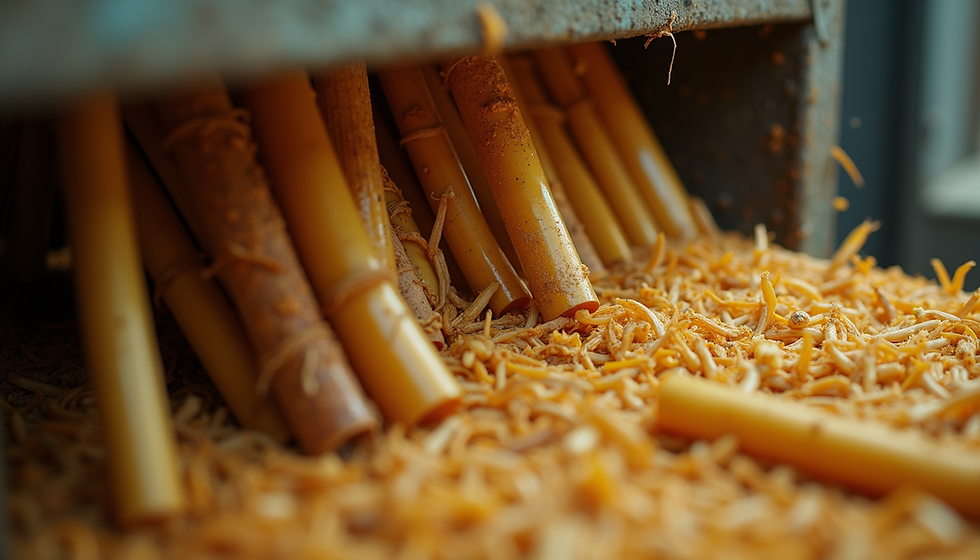Brazil's Role as a Sugar Exporter
- writer
- 3 days ago
- 4 min read
Brazil has long been a leader in the global sugar market. Its role as a major sugar exporter is significant. The country produces large quantities of sugar and exports it worldwide. This blog post explores Brazil's position in the sugar industry, its production methods, export strategies, and what makes it a reliable supplier for global industrial sugar buyers and large brands.
Brazil Among the Major Sugar Exporters
Brazil is one of the largest sugar producers and exporters in the world. It consistently ranks at the top alongside countries like India and Thailand. The country's climate and vast arable land make it ideal for sugarcane cultivation. Sugarcane is the primary raw material for sugar production in Brazil.
The sugar industry in Brazil is highly developed. It uses modern technology and efficient farming practices. This allows Brazil to produce sugar at a competitive cost. The country exports sugar to many regions, including Asia, Europe, and North America.
Brazil's sugar exports contribute significantly to its economy. The industry provides jobs and supports rural communities. It also generates foreign exchange earnings. These factors make Brazil a key player in the global sugar market.

Production and Export Strategies of Major Sugar Exporters
Brazil's success as a major sugar exporter comes from its production and export strategies. The country focuses on high yield and quality. It invests in research and development to improve sugarcane varieties and farming techniques.
Brazil uses mechanized harvesting to increase efficiency. This reduces labor costs and speeds up the process. The country also employs advanced milling technology to extract sugar efficiently.
Export strategies are equally important. Brazil maintains strong relationships with international buyers. It offers competitive pricing and reliable supply. This builds trust and long-term partnerships.
Brazil also benefits from its geographic location. Its ports are well connected to global shipping routes. This reduces transportation time and costs for buyers.
For those interested in connecting with reliable suppliers, brazil sugar exporters provide direct access to Brazilian mills. This ensures buyers get high-quality sugar at competitive prices.
The Impact of Sustainability on Brazil's Sugar Industry
Sustainability is becoming a key focus in Brazil's sugar industry. The country is adopting practices that reduce environmental impact. This includes better water management, reduced use of agrochemicals, and protection of native forests.
Many mills in Brazil use bagasse, a byproduct of sugarcane, as a renewable energy source. This reduces reliance on fossil fuels and lowers carbon emissions.
Sustainability also means social responsibility. Brazilian sugar producers work to improve labor conditions and support local communities. This is important for global buyers who prioritize ethical sourcing.
Adopting sustainable practices helps Brazil maintain its position as a preferred sugar supplier. It meets the growing demand for environmentally friendly products in global markets.

Challenges Faced by Brazil in the Sugar Export Market
Despite its strengths, Brazil faces challenges in the sugar export market. Weather conditions such as droughts or excessive rain can affect sugarcane yields. This impacts production volumes and export capacity.
Global sugar prices are volatile. Fluctuations can affect profitability for producers and exporters. Brazil must balance production costs with market prices to remain competitive.
Trade policies and tariffs in importing countries also influence Brazil's exports. Changes in regulations can create uncertainty for exporters and buyers.
To overcome these challenges, Brazil invests in technology and innovation. It also diversifies its export markets to reduce dependence on any single region.
Why Choose Brazilian Sugar Exporters for Your Industrial Needs
Choosing Brazilian sugar exporters offers several advantages. First, Brazil produces sugar in large volumes, ensuring a steady supply. This is crucial for industrial buyers who need consistent delivery.
Second, the quality of Brazilian sugar is high. The country follows strict quality control measures. This guarantees that buyers receive sugar that meets their specifications.
Third, Brazilian exporters offer competitive pricing. The efficiency of production and logistics helps keep costs low. This benefits buyers looking to optimize their supply chain expenses.
Finally, Brazilian sugar exporters are committed to building long-term partnerships. They provide transparent communication and reliable service. This fosters trust and smooth business operations.
For global industrial sugar buyers and large brands, partnering with Brazilian suppliers is a smart choice. It secures access to high-quality sugar with dependable delivery and competitive prices.
Looking Ahead: Brazil's Future in the Global Sugar Market
Brazil's role as a major sugar exporter is set to continue growing. The country is expanding its production capacity and improving sustainability. It is also exploring new markets and strengthening existing ones.
Technological advancements will further enhance Brazil's efficiency and product quality. This will help the country meet the evolving needs of global buyers.
Brazilian sugar exporters aim to be the top global supplier of high-quality Brazilian sugar. They focus on connecting international buyers directly with Brazilian mills. This approach supports diverse industrial needs and secures long-term partnerships.
In summary, Brazil remains a reliable and competitive source of sugar for the global market. Its production scale, quality, sustainability efforts, and export strategies make it a preferred partner for industrial sugar buyers worldwide.

![ICUMSA 45 vs ICUMSA 150: Which Sugar Grade Do You Need? [2025 Buyer's Guide]](https://static.wixstatic.com/media/72bceb_4e1ee5270e7c4b1492fe27390176440e~mv2.jpg/v1/fill/w_980,h_980,al_c,q_85,usm_0.66_1.00_0.01,enc_avif,quality_auto/72bceb_4e1ee5270e7c4b1492fe27390176440e~mv2.jpg)

Comments